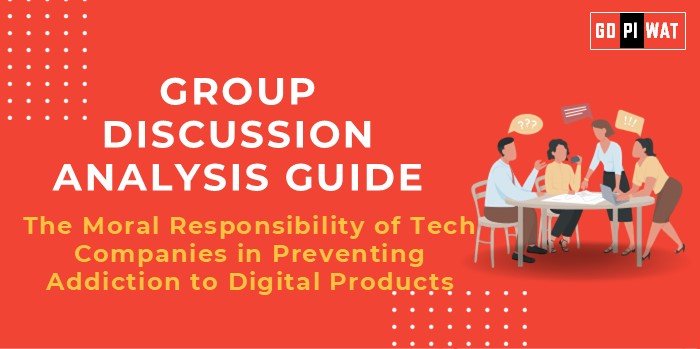📋 Group Discussion (GD) Analysis Guide: The Moral Responsibility of Tech Companies in Preventing Addiction to Digital Products
🌐 Introduction to the Topic
Opening Context:
The rise of social media, gaming, and streaming platforms has brought immense value to consumers, but it has also raised ethical concerns about their design practices encouraging addiction.
Topic Background:
The concept of “digital addiction” stems from how digital products exploit human psychology to increase screen time. With over 4.8 billion internet users worldwide as of 2024, tech companies face growing scrutiny over their ethical responsibilities.
📊 Quick Facts and Key Statistics
- 🌍 Global Internet Users: 4.8 billion (2024) – demonstrating the pervasive influence of tech platforms.
- 🕒 Social Media Average Usage: 2.5 hours/day globally – indicative of potential over-reliance on digital products.
- 💰 Ad Revenue from Increased Engagement: $400 billion annually – highlights financial incentives for addictive designs.
- 🩺 Mental Health Impacts: 30% rise in anxiety and depression among heavy digital users (WHO, 2023).
🧩 Stakeholders and Their Roles
- 💼 Tech Companies: Design and market digital products; responsible for ethical product strategies.
- 🏛️ Regulators: Ensure laws against exploitative practices are implemented.
- 👥 Users: Advocate for transparency and responsible product usage.
- 🌐 Health Organizations: Provide data and advocate for policies addressing addiction impacts.
🏆 Achievements and Challenges
✨ Achievements:
- 📱 Self-Regulation Initiatives: Apple’s Screen Time feature promotes user awareness.
- 🎮 WHO Recognition: Gaming addiction identified as a disorder (2018).
- 💻 Ethical Design Guidelines: Emerging standards from firms like Microsoft.
⚠️ Challenges:
- 💵 Revenue-Driven Models: Financial incentives reward increased screen time.
- 🌍 Lack of Global Consensus: Disparities in digital addiction policies.
- 📢 Limited Public Awareness: Many users remain unaware of digital manipulation tactics.
🌎 Global Comparisons:
- 🇰🇷 South Korea: Government-backed programs for gaming addiction.
- 🇪🇺 EU: Stricter data privacy laws discouraging manipulative designs.
💬 Structured Arguments for Discussion
- Supporting Stance: “Tech companies hold moral responsibility as their designs directly influence user behavior and societal well-being.”
- Opposing Stance: “User agency and self-regulation should be prioritized over corporate accountability.”
- Balanced Perspective: “While users must practice moderation, tech companies should adopt ethical design practices to curb addictive tendencies.”
📚 Effective Discussion Approaches
Opening Approaches:
- 💬 Quote: “With great power comes great responsibility – should this apply to tech giants?”
- 📊 Data Start: “Did you know that social media usage exceeds 2 hours/day for 90% of teens worldwide?”
Counter-Argument Handling:
- ✔️ Claim: “Addiction is a personal choice.”
- 💡 Response: “Behavioral science shows that platforms are engineered to exploit psychological vulnerabilities.”
📈 Strategic Analysis of Strengths and Weaknesses
- ✔️ Strengths: Global connectivity; mental health awareness campaigns by tech companies.
- ❌ Weaknesses: User manipulation; lack of regulation.
- 💡 Opportunities: Ethical tech certification; user education programs.
- ⚠️ Threats: Increasing public distrust; regulatory crackdowns.
🏫 Connecting with B-School Applications
Real-World Applications:
- 🌟 Case studies in ethical marketing strategies or AI-based user experience designs.
Sample Interview Questions:
- ❓ “How can tech companies balance revenue growth with ethical responsibility?”
- ❓ “Evaluate global approaches to tackling digital addiction.”
Insights for B-School Students:
- 💼 Ethical product design as a business strategy.
- 📊 Opportunities in digital wellness entrepreneurship.


